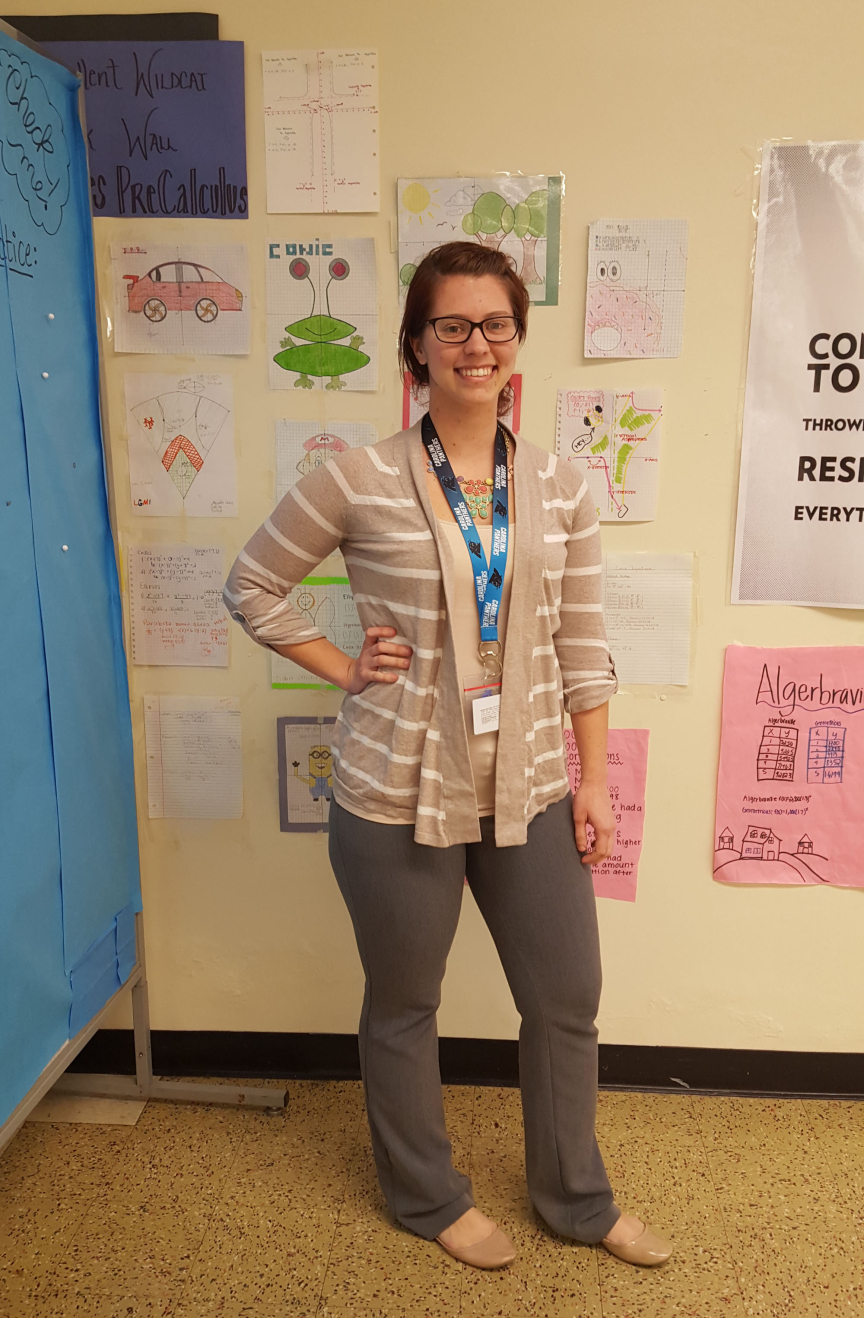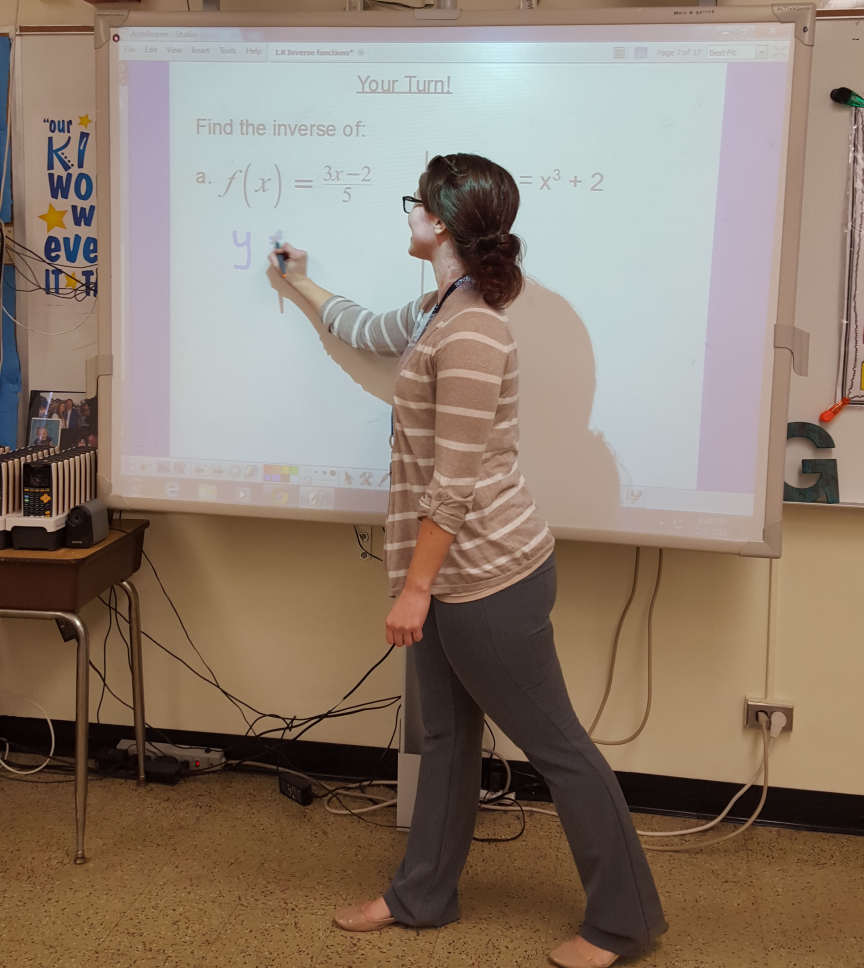Rutgers Graduate’s Journey from Accounting to High School Math Teacher
As a Rutgers business student, Colleen Grosse discovered her love of teaching and a passion for helping struggling kids reach their potential

'Students are often taught the procedures of math and don’t know why it matters. I want them to see how it aligns with their future, to see themselves using it in careers.'– Colleen Grosse

When the doors open at 6 a.m. at Garinger High School in Charlotte, North Carolina, Colleen Grosse is typically walking through them. She preps for her math classes before meeting the buses and making sure students go where they need to go. After school, she’s available for tutoring every day, grades assignments and works on plans for upcoming classes before leaving by 6 p.m.
“I want my kids to see math in a different way,” says Grosse, a 2013 graduate of Rutgers Business School-Newark and New Brunswick. “Students are often taught the procedures of math and don’t know why it matters. I want them to see how it aligns with their future, to see themselves using it in careers.”
Grosse is 615 miles away from her hometown, Brick, New Jersey, and a world away from her original career plan to be an accountant when she arrived at Rutgers University in 2009. The first in her family to go to college, Grosse says Rutgers was always tops on her list. Her dad’s, too. “He had a lot of pride for the school even though he didn’t go to college,” she says. “He wanted me to be independent and pave a road for myself.”
Admitted through the Educational Opportunity Fund (EOF) program, she commuted to New Brunswick from her dad’s home in South Amboy – her mom remained in Brick after her parents divorced – and began taking classes toward an accounting degree. It seemed the sensible path since she liked math and was extremely organized. Then, she started taking acting and sociology classes alongside calculus and macroeconomics and her worldview widened.
“I started to realize that I cared about social justice and educational equity, and I started to question the business mindset for my own path,” she says.
Just as Grosse began to rethink her path forward, her father fell ill in the summer after her first year at Rutgers. A construction worker who helped with the World Trade Center cleanup after 9/11, he suffered a series of liver and kidney infections and complications that brought him to Robert Wood Johnson Medical Center in New Brunswick. In the fall, Grosse visited him in between classes. He died in October 2010.
“There was never a question of withdrawing from school,” she says. “I know if I had, he would have been disappointed.” She drew on his support and the help of her mom and mentors at Rutgers, including Martin Markowitz, RBS associate dean, who provided advice and direction. She sought scholarships, lived with friends one year in an off-campus apartment and commuted from her mom’s home in Brick the other years so she could graduate loan-free.
“Colleen’s success is directly attributable to Colleen,” says Markowitz, whose father also died while he was in college. “She is a very special person.” He credits Grosse with helping make the RBS chapter of the Future Business Leaders of America-Phi Beta Lambda more prominent, and for being a great EOF role model and peer instructor in a 10-week First-year Interest Group Seminar (FIGS) at Rutgers-New Brunswick. “I require EOF students to take a FIGS with an EOF peer instructor,” he says. “It provides them with a support group in a relatively large university.”
Grosse applied to teach a FIGS on “Exploring Business.” Teaching 20 undergrads while she was still an undergrad and active as president and state membership director of Phi Beta Lambda, Grosse realized she loved teaching. “It pushed me out of my comfort zone – something now I’m very grateful for, because that’s what you really need,” she says.
Still, as graduation neared, she was intent on mixing marketing with her interests in sociology and criminology – mainly understanding why people make the choices they do, good and bad. While working at a digital marketing firm and searching for jobs, Teach for America came calling. “They sold me on the idea of going into the classroom to see where I fit in and if I can make a big impact,” she says. After getting certified to teach math, she did a practice teaching stint in Oklahoma and then got the assignment she requested in Charlotte.

Nearly three years in, Grosse loves the challenges of teaching math to a diverse group of high school kids, many immigrants who arrived in Charlotte after difficult childhoods and journeys. She’s taught students from the Congo, Egypt, Sudan and Mexico. One third of Garinger’s students are learning English as a second language. One student had been kidnapped by a Mexican cartel and forced to work for them for three years. “When I see students like him working so hard, learning a new language for three or four hours after school every day – that’s something no marketing job can give you,” she says. “I’m seeing students take control of their lives despite everything that’s against them. It’s awesome.”
She encourages her students to break out of stereotypes that can limit and define them. “Some students come from poverty like me and many of them outperform students from more affluent environments,” Grosse says. “They are actively combating unfair assumptions made about them.”
Living on her own in a new city, Grosse is bucking a few trends for her millennial generation. While employment has increased for adults 18 to 34 along with all workers, the number of millennials living independently and apart from their families has dropped, according to the Pew Research Center.
Charlotte’s affordability plus having no student debt helps. (“You can find a really nice one-bedroom apartment for $600 a month,” Grosse says.) She loves the diversity of Charlotte and how there is always something to do outdoors.
“There’s a national whitewater center 15 minutes from my apartment, and a whole area uptown where there are cool things to do,” she says. Grosse has a great group of friends – there are lots of young college grads, including many from New Jersey, working in Charlotte – but dating is another story. “It’s hard to go on a date and have whimsical lighthearted conversations” after her intense days at school, she says. “I’m married to my work right now.”
She is where she wants to be and plans to stay at Garinger in Charlotte for a long time. “I know education is my calling,” Grosse says. “I want to be a mentor for students who struggle and have no one pushing for them. If I didn’t have my dad, I don’t think I would be here.”
For media inquiries, contact Dory Devlin at dory.devlin@rutgers.edu or 973-972-7276